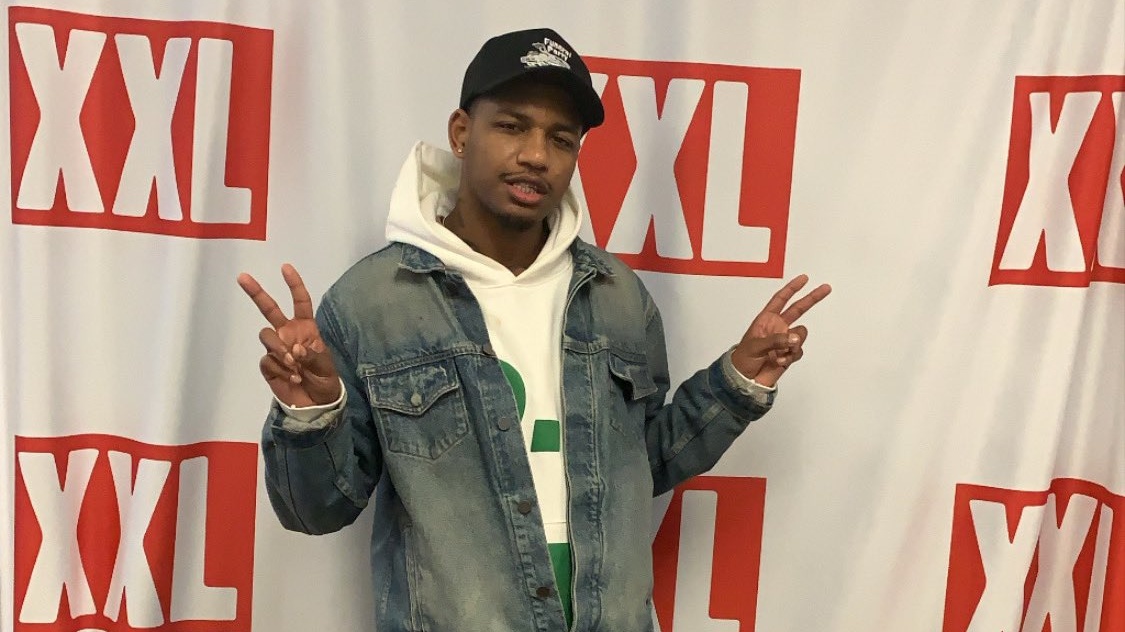Artists brought out all the stops on the red carpet for the 62nd Grammys on Sunday, and one rapper made sure to bring the culture to the annual awards ceremony.
While a number of artists were dressed to the nines, rapper Guapdad4000 might have to be crowned best dressed for sporting one of the Blackest accessories to ever hit the typically white-leaning awards show. The California native, styled by Charles Reynolds, wore a Rick Owens two-piece suit. While he opted to go shirtless under the jacket, he rocked chains and an iced out grill. The most distinctive part of his fit, though, was the Faded NYC durag that included a 10-foot train typically seen on ball gowns.
The rapper, who dropped his debut album Dior Deposits in October, posed on the red carpet with the durag elegantly flowing behind him.
The 27-year-old was nominated for Best Rap Album for his work on Dreamville’s Revenge of the Dreamer’s 3. While the album didn’t take home the win, the “Gucci Pajamas” rapper was praised by fans for his creative swag. Guapdad is in the running for induction into XXL Magazine's 2020 Freshman class for up-and-coming rappers.
The Ferragamo Falcon came to the office today. Should @guapdad4000 be a 2020 XXL Freshman? ???? pic.twitter.com/eDsAMbupQG
— XXL Magazine (@XXL) January 28, 2020
Listen, with today being such a sad day, I’m glad to see Guapdad’s 10 ft Durag on the Grammy’s red carpet. Best Dressed of the night, i don’t care
— Alex Thee Stallion (@zandiethegreat) January 27, 2020
This looks like a modern day Renaissance picture. You got Buddy lighting up, and Guapdad 4000 wearing a 10ft durag. Men who came up from the streets to the Grammy’s. Elegance! Call it “The Birth of the Scammers,” if you would ❤️???? https://t.co/jNztAmtQyX
— Berenice ????✨ (@HBK_Berenice) January 28, 2020
Guapdad’s durag train is the highlight of the Grammy’s ????
— Diamonds Dancing Stan Account (@jusdrea_) January 27, 2020
Billy Porter was also inspired to wear statement headwear on the red carpet. The Pose actor sported an animatronic blue hat that included remote-controlled moving fringe. Of course, the internet immediately had jokes — all in good fun.
Me: I can’t go out, I’m trying to save money this week
Friend: wanna go to happy hour?
Me:
pic.twitter.com/1bPdx0Fzaw— dunc city (@whduncan) January 27, 2020
Me: I hate drama
Also me when there’s drama: pic.twitter.com/sCyKFgnzZK
— Sam Stryker (@sbstryker) January 27, 2020
The Best Rap Album Grammy winner, Tyler the Creator, rocked a bell boy outfit complete with a tiny top hat and luggage that contained his outfit change. The Golf Wang leader, always putting his eclectic style on display, stayed in character down the carpet and finished his look off with white gloves and tiny black glasses.
tyler the creator is giving us esteban from suite life of zach and cody and i’m honestly here for it. #GRAMMYs
pic.twitter.com/DWTrJ27Glc— clem???????? (@clxmon) January 27, 2020
BAGS MY GOOD SIR? pic.twitter.com/69G5adi8Qi
— Tyler, The Creator (@tylerthecreator) January 28, 2020
Later on during the show, the rapper performed “Earfquake” and “New Magic Wand” while donning his classic blonde, mushroom-cut wig.
After his win, the 28-year-old called out the academy for always pigeon-holing Black artists in “rap” and “urban” categories. While he expressed gratitude for being recognized for his work, he also said he hopes they change the way they honor Black art.
“On one side I’m very grateful, that what I made could just be acknowledged in the world like this, but also it sucks that whenever we, and I mean guys that look like me, do anything that’s genre-bending, or that’s anything, they always put it in a ‘rap’ or ‘urban’ category. I don’t like that ‘urban’ word, it’s just a politically correct way to say the n-word to me,” he said during a backstage interview. “Half of me feels like the rap nomination was a backhanded compliment.”
